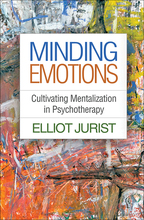Minding Emotions
Cultivating Mentalization in Psychotherapy
Elliot Jurist
HardcoverPaperbacke-bookprint + e-book
Hardcover
orderApril 9, 2018
ISBN 9781462534999
Price: $51.00 200 Pages
Size: 6" x 9"
Paperback
orderNovember 6, 2019
ISBN 9781462542918
Price: $34.00200 Pages
Size: 6" x 9"
Mentalization—the effort to make sense of our own and others' actions, behavior, and internal states—is something we all do. And it is a capacity that all psychotherapies aim to improve: the better we are at mentalizing, the more resilient and flexible we tend to be. This concise, engaging book offers a brief overview of mentalization in psychotherapy, focusing on how to help patients understand and reflect on their emotional experiences. Elliot Jurist integrates cognitive science research and psychoanalytic theory to break down “mentalized affectivity” into discrete processes that therapists can cultivate in session. The book interweaves clinical vignettes with discussions of memoirs by comedian Sarah Silverman, poet Tracy Smith, filmmaker Ingmar Bergman, and neurologist Oliver Sacks. A reproducible assessment instrument (the Mentalized Affectivity Scale) can be downloaded and printed in a convenient 8½“ x 11” size.
Winner—American Board and Academy of Psychoanalysis Book Prize (Theory)
Winner—American Board and Academy of Psychoanalysis Book Prize (Theory)
This title is part of the Psychoanalysis and Psychological Science Series, edited by Elliot Jurist.
“Thoughtful and elegantly written….Clinicians of all types will benefit from this book.”
—Choice Reviews
“This beautifully written, integrated account reflects two decades of Jurist’s thinking about one of the deepest puzzles of psychological treatment—the patient’s experience of his or her own emotion and the way this interfaces with the forces and circumstances of a lived life. Jurist brings clarity to the murky area of the phenomenology of affect. He explains the value of and identifies a coherent approach to the therapeutic focus on emotion. This extraordinary work empowers both therapist and patient to harness the power of affect to drive change in thought and behavior. An extremely significant and most welcome contribution to postmodality psychotherapy.”
—Peter Fonagy, CBE, FMedSci, FBA, FAcSS, Head, Division of Psychology and Language Sciences, University College London, United Kingdom
“A veritable tour de force. Jurist takes the reader on a journey that elucidates the regulation, expression, and mentalization of emotional states. His scope is impressively comprehensive, and he embodies the professor that we all wish we'd had—one who fascinates while educating. I highly recommend this volume to both experienced therapists and students in the mental health professions.”
—Glen O. Gabbard, MD, Clinical Professor of Psychiatry, Baylor College of Medicine
“In this excellent book, Jurist expertly guides the reader through an in-depth exploration and deconstruction of what it means to ‘work with emotions’ in psychotherapy. Drawing on a wide range of ideas from neuroscience, cognitive psychology, and psychoanalysis, Jurist offers an impressive overview grounded in clear clinical and nonclinical examples. This book will be an asset to both qualified and training psychotherapists, psychoanalysts, psychologists, and psychiatrists. Highly recommended.”
—Alessandra Lemma, DClinPsych, Consultant, Anna Freud National Centre for Children and Families, London, United Kingdom
“Do we know what we feel? 'Aporetic emotions' inhabit us as unknown, obscure, and often confusing states of mind. Jurist knows that these emotions represent a challenge for any human being and even more for every clinician. With competence, wisdom, and empathy, he tells us how to make them more intelligible. By interweaving his ideas and research findings with autobiographical memoirs of renowned people, Jurist makes us understand what it means to identify, modulate, and express emotions—to mentalize them. This is a book for anyone who wants to build strong therapeutic alliances and be a better clinician, regardless of theoretical orientation.”
—Vittorio Lingiardi, MD, Department of Dynamic and Clinical Psychology, Sapienza University of Rome, Italy
“Minding Emotions is not only a lucid, highly intelligent, and compassionate explication of what it means to identify and mentalize emotions in clinical practice, it is that rare work that deftly integrates research from neurobiology and empirical psychology with philosophy, psychoanalytic theory, case histories, and memoir. Rather than isolating science from the therapeutic dyad and the art of narrative, Jurist makes an astute argument for their unification in this important book.”
—Siri Hustvedt, PhD, novelist, essayist, and Lecturer in Psychiatry, Weill Cornell College
“Emotions are essential to healing and recovery from mental health concerns. I have used this text with students and interns to support their awareness of emotions and their ability to work with them in therapy. Students benefit from the clear writing style and the way that examples and research are woven together. Jurist gives students and interns a text to return to again and again throughout their careers.”
—Mary Minten, PhD, MFT, CST, LCADC, Instructor, Center for the Application of Substance Abuse Technologies, University of Nevada, Reno
Table of Contents
IntroductionI. Identifying, Modulating, and Expressing Emotions
1. Identifying Emotions
2. Modulating Emotions
3. Expressing Emotions
Coda
II. Mentalized Affectivity
4. Mentalizing Emotions
5. Cultivating Mentalized Affectivity
6. Mentalized Affectivity, Therapeutic Action, and the Communication Paradigm
7. Mentalized Affectivity and Contemporary Psychoanalysis
Conclusion
Appendix. Mentalized Affectivity Scale
